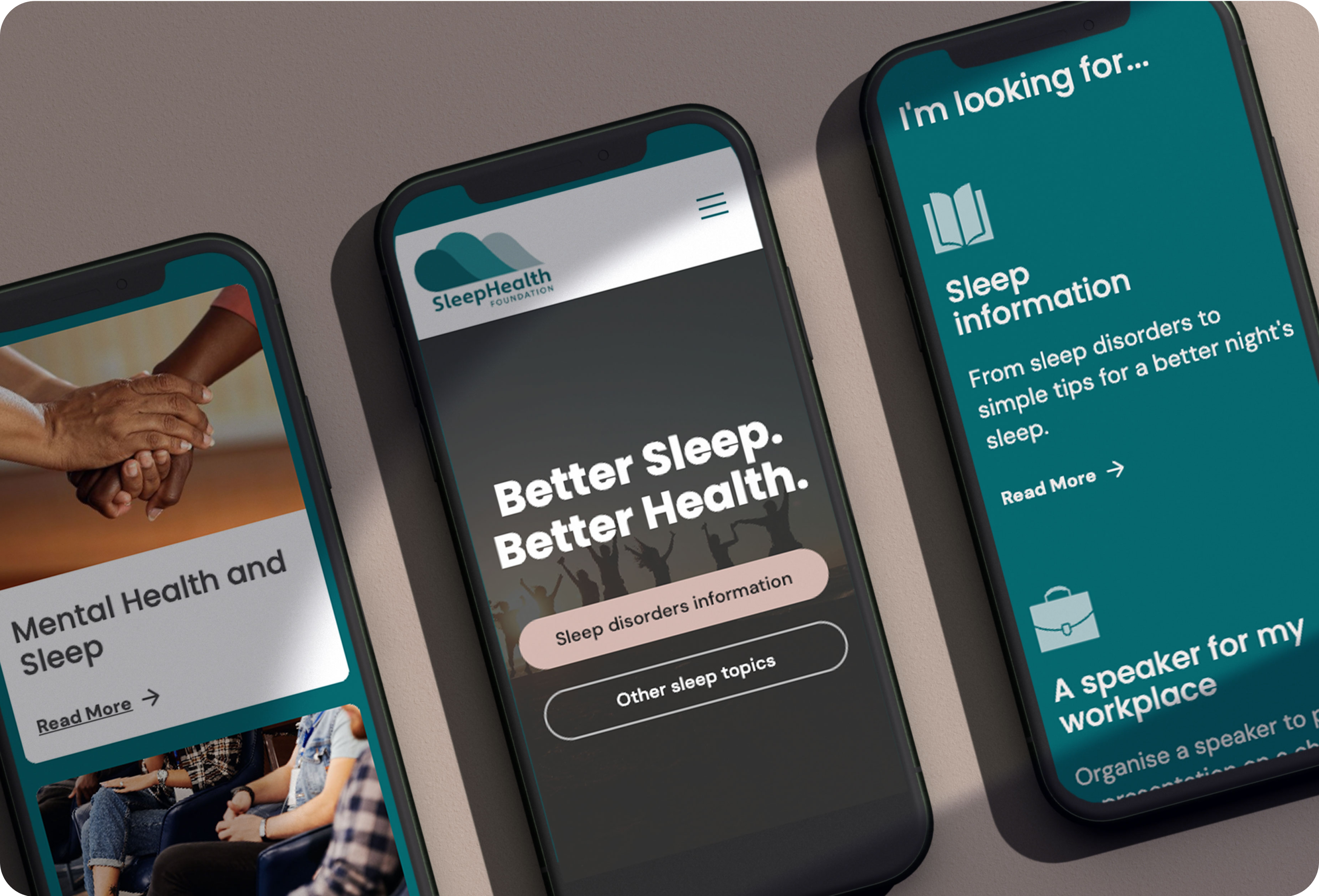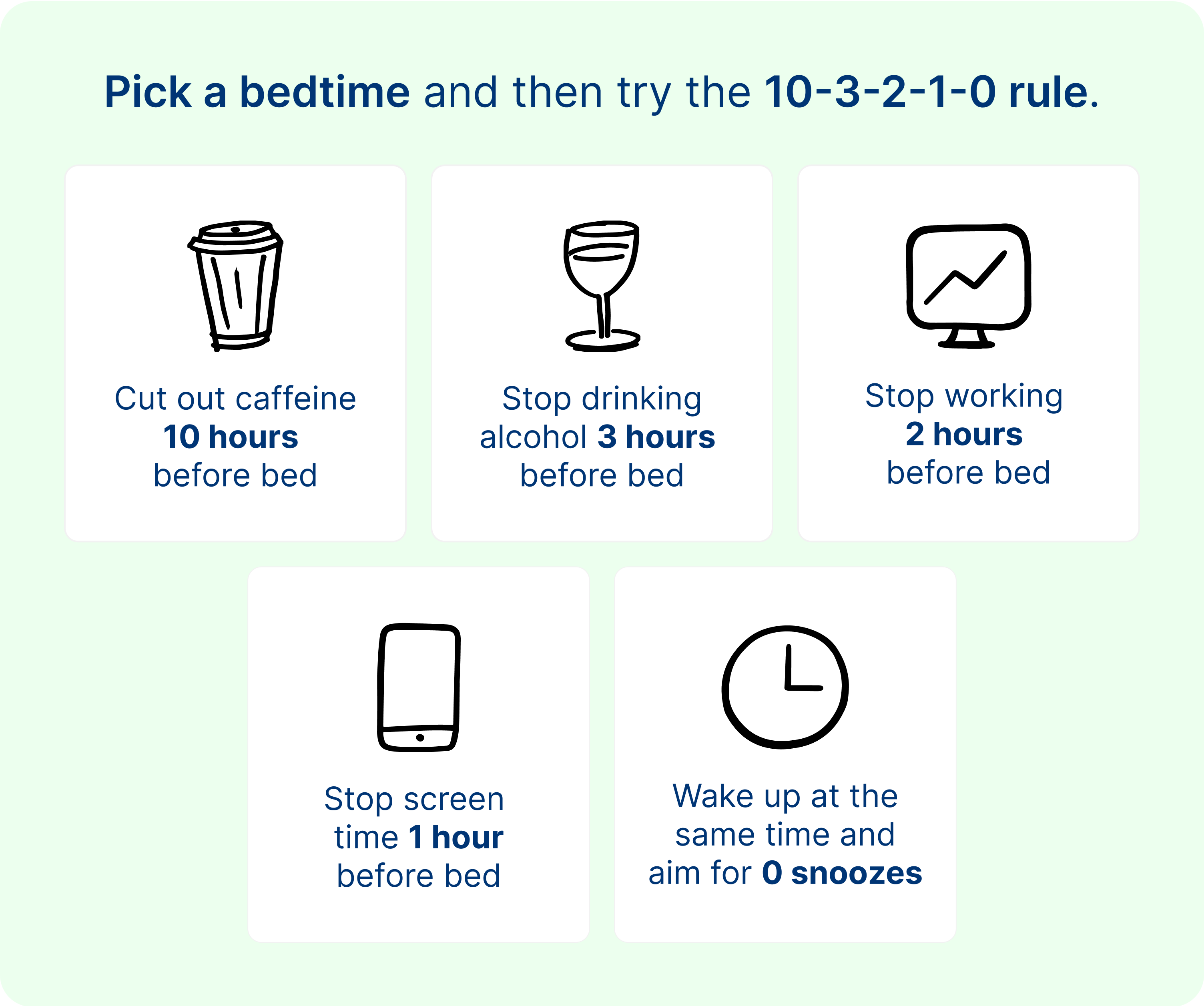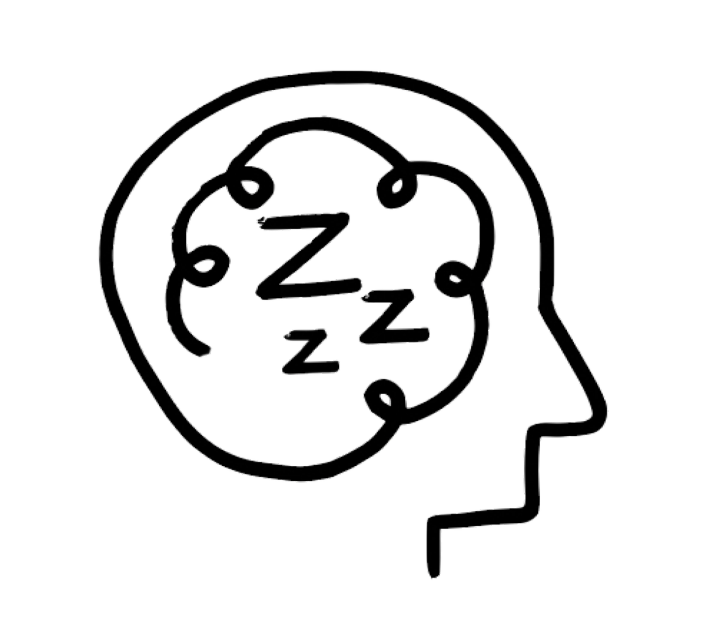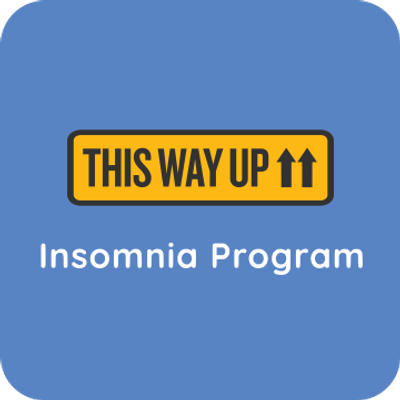How does sleep impact mental health?
Just like with food and water, we rely on sleep to survive. And just like how getting the right amount of the right foods impacts our overall health, so does the quantity and quality of our sleep.
For example, getting enough quality sleep can boost our mood and make it easier to deal with stress, while poor sleep can cause us to feel irritable and make it harder to deal with stress. If you have a mental health condition like anxiety or depression, poor sleep can also make it harder to manage symptoms.
Sleep and mental health are closely connected, which is why it's common to struggle with your sleep if you're experiencing mental health challenges and struggle with your mental health if you're experiencing sleep problems.

If you’re having trouble sleeping, you’re not alone. Nearly half of all Australians report experiencing at least two sleep-related problems. Challenges like financial stress, relationship problems, and the loss of a loved one can be overwhelming. When you're going through a tough time, it makes sense if you’re also finding it hard to sleep at night.
Regardless of what might be negatively impacting your sleep, there are a lot of things you can do to improve it. And when you do, you'll likely notice your mental health and overall wellbeing improve, too.
Scroll down to learn more.
Signs of poor sleep
Sleep problems include things like:
- Difficulty falling or staying asleep (depending on the severity, this can be called insomnia)
- Difficulty waking up or getting out of bed
- Feeling exhausted even when you’ve slept through the night
- Sleeping an excessive amount
- Being unable to sleep due to symptoms associated with mental health conditions like anxiety, panic attacks, or psychosis.
Sleep problems occur for all kinds of reasons and impact everyone differently. Not always, but generally, if your sleep problems become a continuous pattern, they can impact both your physical and mental health.
- Mental and emotional effects
Poor sleep can lead to:
- Difficulty concentrating
- Memory problems
- Brain fog
- Irritability and anger
- Feeling ‘flat’ or sad
- Loneliness and isolation
- Sleep deprivation (this is when you have poor sleep for a prolonged period of time)
- Feelings of anxiety and depression
- Symptoms of psychosis
- Suicidal thoughts.
- Physical effects
Looking for help with a diagnosed sleep condition?
If yes, you may want to visit the SleepHealth Foundation website. You'll find fact sheets on common sleep conditions, such as insomnia, restless leg syndrome, sleep apnoea, and excessive daytime sleepiness, as well as information on where to find further support.
If your condition is making you feel overwhelmed or distressed, you may find other areas of the Support Toolkit helpful. And, of course, you can contact Lifeline 24 hours a day, 7 days a week via 13 11 14, text, and chat.

Why can't I sleep?
It’s normal to have temporary sleep problems if you’re stressed or experiencing significant life events like moving homes, changing jobs, or ending a relationship.
If, over time, you find that those sleep problems stick around, it can be helpful to start looking at your habits, lifestyle, environment, physical health problems, and/or mental health as potential reasons.
While a Coke in the afternoon might not seem like a big deal, the caffeine may be the thing that’s keeping you up at night. Or maybe you have great habits in place to protect your sleep but your mind won’t seem to calm down.
Below, you’ll find lists of common causes of sleep problems. Check them out and see what may apply to you.
Common sleep disruptors

A note to parents and caregivers
There are a number of things that can make it hard to sleep as a parent or caregiver, and it's not your fault if you're struggling to get enough quality sleep. The important thing is that you're being kind to yourself and giving yourself permission to make the most of any sleep you can get.
If you’re struggling to sleep and would like support, you can:
- Read our sleep tips for parents and caregivers
- Contact Tresillian for advice, parenting guides, and in-person support
- Book an appointment with a GP to make a Mental Health Treatment Plan
If those don’t feel like options for you at the moment, you can always contact Lifeline. We're here for you 24 hours a day, 7 days a week via 13 11 14, text, and chat. If life is in danger, call 000.
How do existing mental health challenges impact sleep?
If you’re currently experiencing challenges with your mental health, some of the symptoms associated with those challenges might be impacting your ability to sleep.
For example, your sleep might be impacted by:
- Worries, concerns, or intrusive thoughts
- Difficulty physically or mentally calming down
- Panic attacks
- Seeing things or hearing sounds that aren’t there
- Psychiatric medication (starting, taking or stopping).
It’s really common for mental health challenges like anxiety, depression, stress, psychosis, and trauma to result in sleep challenges, and it’s nothing to feel bad about. The good news is that no matter what symptom(s) you’re experiencing, your sleep can and will get better.
To get a clearer idea of how your sleep might be impacted, you can explore our information and resources on some of the most common mental health challenges by clicking here.
Not getting enough sleep can leave you feeling overwhelmed, distressed, and alone.
If you’re struggling to cope and would like support, you can:
- Learn tips for talking to someone you trust
- Make an appointment with a GP
- Contact Lifeline. We're here for you 24 hours a day, 7 days a week via 13 11 14, text, and chat.
If life is in danger, call 000.
Tips for improving sleep habits
No matter what the underlying cause is, improving your sleep is always possible.
It can be helpful to think of sleep as working for your mind and body in the same way that a phone charger works. The longer you leave it on charge, the better it will perform the next day. So, how much sleep do you need to be ‘fully charged’?
It’s recommended that adults get at least 7 hours of sleep a night.
Depending on what’s happening in your life, you may need more than that. For example, if you’re fighting a cold, grieving a loss, recovering from a medical procedure, or in a highly stressful period of your life, you may need to go to bed earlier or sleep in a bit later.
Below, you'll find practical tips for improving your sleep habits.
Form sleep-friendly habits

Adopt a sleep-friendly lifestyle
- Limit or avoid alcohol and/or nicotine
Zero alcohol is best for sleep. If you drink, try not to have more than 2 standard drinks and consume them at least 3 hours before bed. And if possible, have at least 3-4 alcohol-free nights a week.
Because nicotine is a stimulant, it should be limited or avoided altogether. Remember, withdrawal from nicotine can be something that contributes to sleep difficulty, so make sure you have some of these withdrawal tips to rely on if you are decreasing or ceasing your use of nicotine.
- Limit or avoid caffeine
- Move your body regularly
- Minimise screen time

Create a sleep-friendly environment
- Get the right room temperature
It can be difficult to sleep if you’re too hot or cold. The ideal temperature is 19-22 degrees Celsius.
To create a more comfortable sleep environment, you can try using a fan or heater, choosing different bedding or pyjamas, or opening a window.
- Make it dark and quiet
- Use an eye mask and earplugs
- Keep your bedroom for sleep
Check in with your mental health
- Prioritise and practise self-care
When we’re feeling overwhelmed by work, relationships, or other parts of life, self-care is often the first thing to go. However, it’s important to make time for it because it can help reduce stress and lead to better sleep.
You can learn more in our self-care for mental health and wellbeing article below.
- Find practical ways to reduce and manage stress
- Take time to process significant experiences
- Consider seeing a professional therapist
Strategies for falling asleep
One of the most common challenges of falling asleep is a busy mind. It doesn’t matter how tired you might be; thoughts, to-do lists, and worries about the future seem to love showing up as soon as your head hits the pillow.
If a racing mind is keeping you up, a sleep strategy like visualisation can help you relax.

Scroll down to learn more strategies for falling asleep.
- Try deep breathing
Deep breathing is a grounding technique that can help you feel calm and relaxed. While there are a number of ways to do this, a great one for sleep is the box breathing technique.
You can try it now by clicking play on the video below.
A simple instructional video for box breathing - Do a body scan
- Listen to something to calm your mind
- Label and let go of thoughts
- Play the alphabet name game
- List or think of something in order
- Get up and start over
Keep in mind that everyone is different. The sleep strategies that work for someone else may not work for you and that’s okay. The main this is that you keep experimenting and ask for help when needed.
Tips for going back to sleep in the middle of the night
Waking up in the middle of the night is one of the most common sleep problems, especially if you’re a parent or caregiver.
If possible:
- Stay in bed (or get back in bed after settling your child)
- Don’t pick up your phone/tablet
- Avoid clock-watching (it can make you feel anxious)
- Use the toilet or have a small drink of water
- Try a sleep strategy from above to relax your mind
- Rest assured that as long as you’re lying still, your body is still getting rest.
Sleep tips for parents and caregivers
Parenting is a hugely challenging experience, even when you get enough sleep. Doing it with poor sleep, which is extremely common during this time, can make everything feel extra overwhelming and unmanageable.
Remember, sleep deprivation can heavily impact your mental health and wellbeing. It’s important you’re putting on your own oxygen mask before helping others.
- If possible, try to sleep when the baby is asleep. It can be difficult to sleep during the day but even just lying down and closing your eyes can help you regain some energy.
- Choose sleep over household chores. When it comes to priorities, sleep is much more important than a clean kitchen. It’s okay to let household chores temporarily fall by the wayside or be outsourced to others.
- Place the bassinet or cot near your bed. This can make it easier to tend to the baby and quicker to get back to sleep.
- Share overnight baby duties. If possible, alternate who is on call to tend to the baby at night. This can allow you to catch up on previous sleep loss.
- Live a sleep-friendly lifestyle and form sleep-friendly habits
- Try a sleep technique to help relax your mind and fall asleep.
- If you and/or your children are having trouble sleeping, help is available.
You can:
- Visit the Centre of Perinatal Excellence (COPE) website to learn more about lack of sleep with a baby
- Connect with Tresillian (1300 272 736) for free advice, parenting guides, and support (in-person services are available in NSW, ACT, and VIC)
- Reach out to the Gidget Foundation for perinatal mental health support.
When to reach out for support
If you feel like you’ve made significant changes but are still struggling to get quality sleep, you may want to consider speaking with a GP. They can help you rule out any underlying issues or medical reasons and connect you with the right sleep help.
For example, a GP can:
- See how your lack of sleep is impacting your overall health
- Check your medications/ supplements to see if an ingredient is causing problems. (If something you’re taking contains an ingredient preventing sleep, it doesn’t mean you have to stop taking it. You might just adjust the time you take it.)
- Request blood work to check for any issues
- Suggest you have a sleep study to rule out sleep conditions like sleep apnoea
- Recommend self-led support options like This Way Up's Insomnia Program
- Refer you to a sleep clinic. If your sleep problems are due to a child in your care, they may connect you with a sleep clinic like Tresillian, which specialises in helping parents and carers with baby settling and routines.
- Work with you on a Mental Health Treatment Plan to access subsidised professional mental health therapies.
Tools and apps
Below, you’ll find tools and apps that can help you create a sleep-friendly lifestyle, build sleep-friendly habits, and find the help you need to manage stress and other mental health challenges.


















